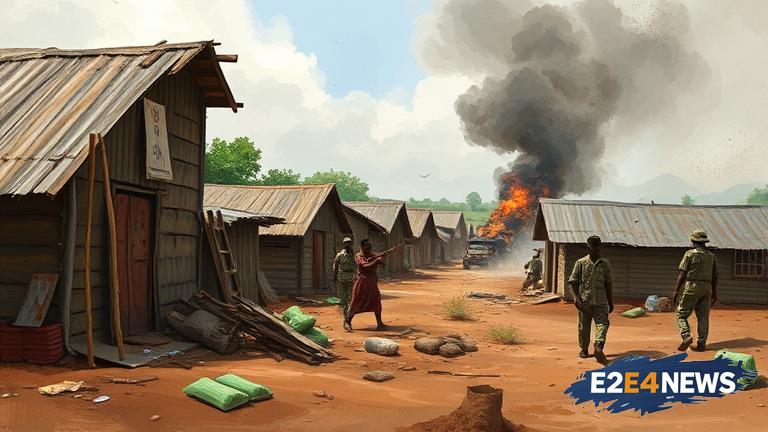The Kajo Keji region has been plagued by violence and instability, with the latest attack by the UPDF resulting in the displacement of over 15,000 individuals. The situation on the ground is dire, with many of those affected struggling to access basic necessities like food, water, and shelter. The attack has also led to the destruction of homes, schools, and other critical infrastructure, exacerbating the humanitarian crisis. The UPDF has been accused of using excessive force, leading to the deaths of several civilians and the displacement of many more. The international community has condemned the attack, calling for an immediate cessation of hostilities and the protection of civilians. The Ugandan government has faced criticism for its handling of the situation, with many arguing that it has failed to adequately address the root causes of the conflict. The humanitarian response to the crisis has been hindered by difficult conditions, including limited access to the affected areas and a lack of resources. Despite these challenges, aid organizations are working tirelessly to provide assistance to those in need, including food, shelter, and medical care. The situation in Kajo Keji is a stark reminder of the devastating consequences of conflict and the need for a peaceful resolution to the crisis. The international community must continue to pressure the Ugandan government to prioritize the protection of civilians and work towards a lasting peace. The people of Kajo Keji deserve nothing less. The conflict in Kajo Keji is a complex issue, with deep-seated roots in the region’s history and politics. The UPDF’s attack is just the latest escalation in a long-standing dispute, and a comprehensive solution will require a nuanced understanding of the underlying issues. The humanitarian crisis in Kajo Keji is not just a local issue, but a regional and international concern. The displacement of over 15,000 people has put a strain on neighboring countries, including South Sudan, which is already struggling to cope with its own refugee crisis. The international community must work together to provide support to those affected by the conflict and to pressure the Ugandan government to find a peaceful solution. The use of force by the UPDF has been widely condemned, and it is clear that a military solution is not the answer. Instead, the focus should be on finding a peaceful resolution to the conflict, one that addresses the underlying issues and prioritizes the protection of civilians. The people of Kajo Keji have suffered for far too long, and it is time for the international community to take action. The situation in Kajo Keji is a stark reminder of the importance of protecting human rights and promoting peace and stability. The Ugandan government must be held accountable for its actions, and the international community must work together to ensure that those responsible for the attack are brought to justice. The humanitarian crisis in Kajo Keji will not be solved overnight, but with the support of the international community, it is possible to make a difference. The people of Kajo Keji deserve our support and our solidarity, and it is time for us to take action. The conflict in Kajo Keji is a complex issue, but one thing is clear: the protection of civilians must be the top priority. The international community must work together to ensure that those affected by the conflict receive the support they need, and that the Ugandan government is held accountable for its actions. The situation in Kajo Keji is a call to action, a reminder that we must work together to promote peace, stability, and human rights. The people of Kajo Keji are not just statistics or news headlines, they are human beings who deserve our compassion, our support, and our solidarity.





